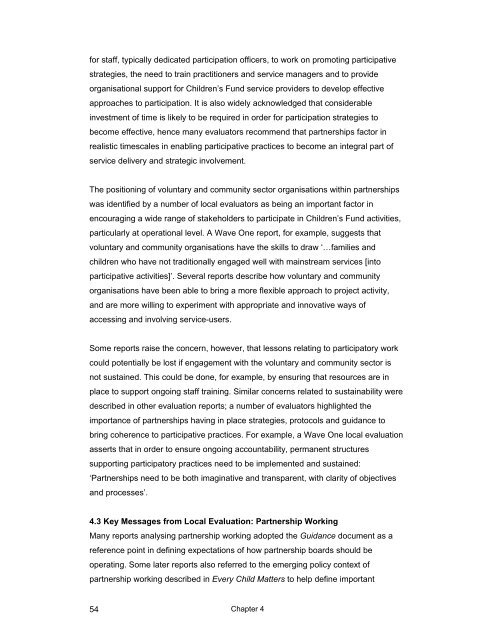Local Evaluation of Children's Services Learning from the Children's ...
Local Evaluation of Children's Services Learning from the Children's ...
Local Evaluation of Children's Services Learning from the Children's ...
- No tags were found...
Create successful ePaper yourself
Turn your PDF publications into a flip-book with our unique Google optimized e-Paper software.
for staff, typically dedicated participation <strong>of</strong>ficers, to work on promoting participativestrategies, <strong>the</strong> need to train practitioners and service managers and to provideorganisational support for Children’s Fund service providers to develop effectiveapproaches to participation. It is also widely acknowledged that considerableinvestment <strong>of</strong> time is likely to be required in order for participation strategies tobecome effective, hence many evaluators recommend that partnerships factor inrealistic timescales in enabling participative practices to become an integral part <strong>of</strong>service delivery and strategic involvement.The positioning <strong>of</strong> voluntary and community sector organisations within partnershipswas identified by a number <strong>of</strong> local evaluators as being an important factor inencouraging a wide range <strong>of</strong> stakeholders to participate in Children’s Fund activities,particularly at operational level. A Wave One report, for example, suggests thatvoluntary and community organisations have <strong>the</strong> skills to draw ‘…families andchildren who have not traditionally engaged well with mainstream services [intoparticipative activities]’. Several reports describe how voluntary and communityorganisations have been able to bring a more flexible approach to project activity,and are more willing to experiment with appropriate and innovative ways <strong>of</strong>accessing and involving service-users.Some reports raise <strong>the</strong> concern, however, that lessons relating to participatory workcould potentially be lost if engagement with <strong>the</strong> voluntary and community sector isnot sustained. This could be done, for example, by ensuring that resources are inplace to support ongoing staff training. Similar concerns related to sustainability weredescribed in o<strong>the</strong>r evaluation reports; a number <strong>of</strong> evaluators highlighted <strong>the</strong>importance <strong>of</strong> partnerships having in place strategies, protocols and guidance tobring coherence to participative practices. For example, a Wave One local evaluationasserts that in order to ensure ongoing accountability, permanent structuressupporting participatory practices need to be implemented and sustained:‘Partnerships need to be both imaginative and transparent, with clarity <strong>of</strong> objectivesand processes’.4.3 Key Messages <strong>from</strong> <strong>Local</strong> <strong>Evaluation</strong>: Partnership WorkingMany reports analysing partnership working adopted <strong>the</strong> Guidance document as areference point in defining expectations <strong>of</strong> how partnership boards should beoperating. Some later reports also referred to <strong>the</strong> emerging policy context <strong>of</strong>partnership working described in Every Child Matters to help define important54Chapter 4
















